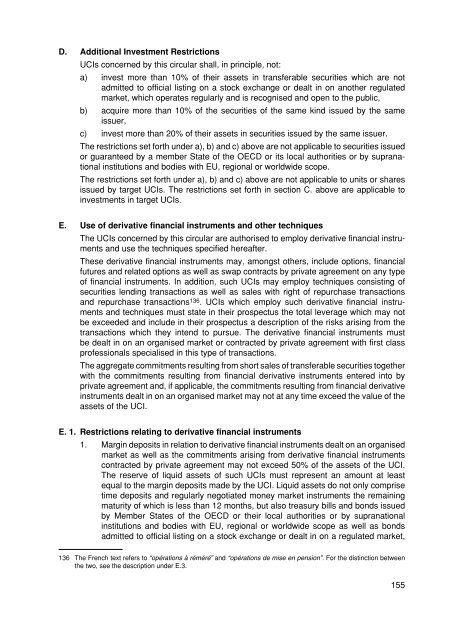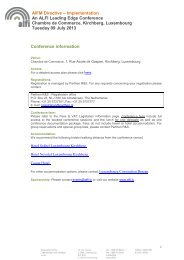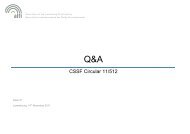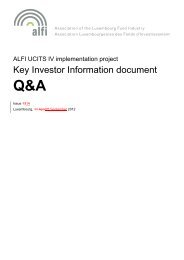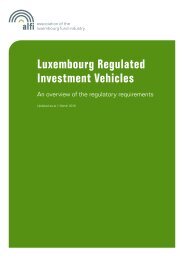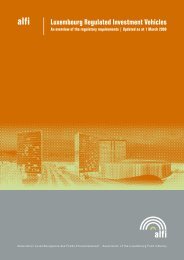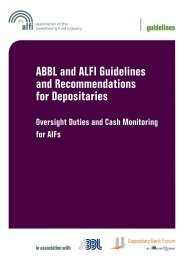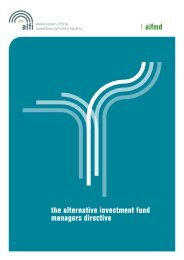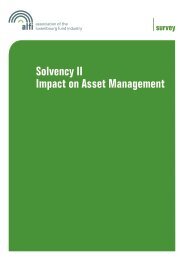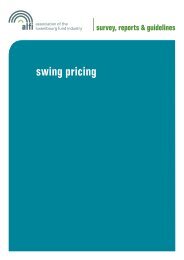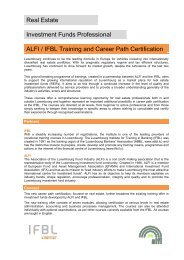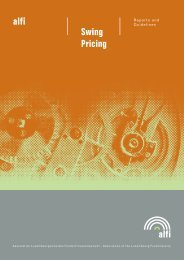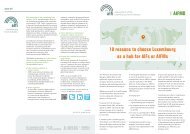law of 20 December 2002 - Alfi
law of 20 December 2002 - Alfi
law of 20 December 2002 - Alfi
- No tags were found...
You also want an ePaper? Increase the reach of your titles
YUMPU automatically turns print PDFs into web optimized ePapers that Google loves.
D. Additional Investment RestrictionsUCIs concerned by this circular shall, in principle, not:a) invest more than 10% <strong>of</strong> their assets in transferable securities which are notadmitted to <strong>of</strong>ficial listing on a stock exchange or dealt in on another regulatedmarket, which operates regularly and is recognised and open to the public,b) acquire more than 10% <strong>of</strong> the securities <strong>of</strong> the same kind issued by the sameissuer,c) invest more than <strong>20</strong>% <strong>of</strong> their assets in securities issued by the same issuer.The restrictions set forth under a), b) and c) above are not applicable to securities issuedor guaranteed by a member State <strong>of</strong> the OECD or its local authorities or by supranationalinstitutions and bodies with EU, regional or worldwide scope.The restrictions set forth under a), b) and c) above are not applicable to units or sharesissued by target UCIs. The restrictions set forth in section C. above are applicable toinvestments in target UCIs.E. Use <strong>of</strong> derivative financial instruments and other techniquesThe UCIs concerned by this circular are authorised to employ derivative financial instrumentsand use the techniques specified hereafter.These derivative financial instruments may, amongst others, include options, financialfutures and related options as well as swap contracts by private agreement on any type<strong>of</strong> financial instruments. In addition, such UCIs may employ techniques consisting <strong>of</strong>securities lending transactions as well as sales with right <strong>of</strong> repurchase transactionsand repurchase transactions 136 . UCIs which employ such derivative financial instrumentsand techniques must state in their prospectus the total leverage which may notbe exceeded and include in their prospectus a description <strong>of</strong> the risks arising from thetransactions which they intend to pursue. The derivative financial instruments mustbe dealt in on an organised market or contracted by private agreement with first classpr<strong>of</strong>essionals specialised in this type <strong>of</strong> transactions.The aggregate commitments resulting from short sales <strong>of</strong> transferable securities togetherwith the commitments resulting from financial derivative instruments entered into byprivate agreement and, if applicable, the commitments resulting from financial derivativeinstruments dealt in on an organised market may not at any time exceed the value <strong>of</strong> theassets <strong>of</strong> the UCI.E. 1. Restrictions relating to derivative financial instruments1. Margin deposits in relation to derivative financial instruments dealt on an organisedmarket as well as the commitments arising from derivative financial instrumentscontracted by private agreement may not exceed 50% <strong>of</strong> the assets <strong>of</strong> the UCI.The reserve <strong>of</strong> liquid assets <strong>of</strong> such UCIs must represent an amount at leastequal to the margin deposits made by the UCI. Liquid assets do not only comprisetime deposits and regularly negotiated money market instruments the remainingmaturity <strong>of</strong> which is less than 12 months, but also treasury bills and bonds issuedby Member States <strong>of</strong> the OECD or their local authorities or by supranationalinstitutions and bodies with EU, regional or worldwide scope as well as bondsadmitted to <strong>of</strong>ficial listing on a stock exchange or dealt in on a regulated market,136 The French text refers to “opérations à réméré” and “opérations de mise en pension”. For the distinction betweenthe two, see the description under E.3.155


